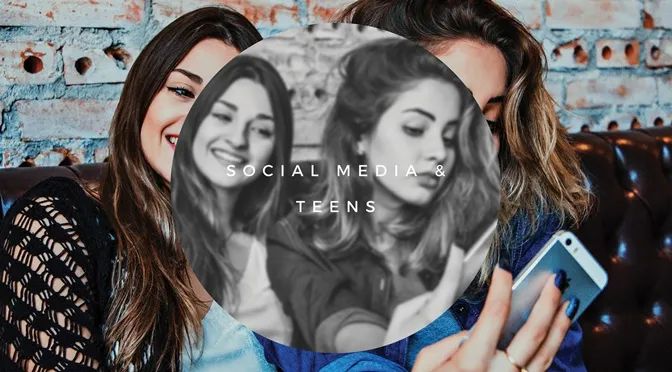
Social Media and Teens
October 2018
by jamie beeson
Social media is like candy; sweet in small doses but if overdone, it causes things to rot, becomes addictive, and brings unwanted consequences. You might be reading this missing the comparison to candy because you don’t agree that social media is sweet at all. Just so we can visit from a similar page, I have to argue FOR social media before I share how I’ve felt warned against it as a parent.
Social media has allowed me to connect with people who were only acquaintances in high school, and it has opened up a doorway of communication that has led to some great friendships. What a sweet benefit that we didn’t have 15 years ago! Eleven years ago, before I joined Facebook, I started a blog to share with our family about our comings and goings, but it was a one-way street. They saw us, but we didn’t see them. Social media has provided quick life sharing.
Social media has also removed geographical limitations for my business. I’m given the privilege of encouraging and coaching women from my home to their home all around the world. I’ve definitely been on the receiving end of that as well! Social media has allowed me to connect with mentors, like-minded individuals, and create a network of resources to help us do what we do, but better! These are just a few of the sweet parts of social media.
You probably don’t need reminders about the rotten parts but our teens might.
Teens have had a large chunk (if not ALL) of their lives influenced by social media. They won’t remember, or may not even know what it was like to leave the house and not be able to be reached by a Snapchat message or DM. This is their norm. As parents, we have the challenge of understanding their world while making sure timeless truths and our family values are still driving their decision-making. While not opposed to my kids using social media, I’ve felt warned about the long-term (and even daily) effects.
Here are 4 things I’ve considered and felt challenged to parent about this social media candy:
Focus on “likes” “hearts” “comments”
Self-esteem, self-worth, and identity are looking for a place to anchor down in their teen years. That’s nothing new. But, having social media as a temptation for their anchoring-place is. I don’t want my kids running to social media to rank their importance, determine their worth, or deem themselves worthy by the abundance (or lack) of “likes,” “hearts,” “comments,” or any other form of engagement. It’s as if their posts become a stage and their followers are the judges.
Cyber-bullying
As if teenagers needed more help being jerks to each other. I remember being quite capable of that all by myself in junior high…without Instagram, Snapchat, and a phone. I don’t need to say any more other than I think it makes it easier, more frequent, and tempting to start it, join it, and see it…where they might not have done any of that if it was in person. It’s like group think, but way worse.
Highlight Reels and Comparison
This one we can relate to as adults. Social media paints a particular picture of our lives, realities, feelings, and even our looks…all of which are either drastically inaccurate or showcase a tiny window. We filter, frame things with just the right words, edit, and choose what the world sees. Our kids look into the realms of those they know and those they don’t and instantly compare themselves. Comparison can lead to all kinds of issues including mental health issues. In a study by the Pew Research center released May 31, 2018, it was discovered that YouTube, Instagram, and Snapchat are the most popular online platforms among teens. 95% of teens have access to a smartphone, and 45% say they are online “almost constantly.” Just like candy, too much is detrimental to our health and being on social media “almost constantly,” comparing our behind-the-scenes to everyone’s highlight reel is just as unhealthy.
Not enough “Face time”
I’m not referring to the Facetime feature on our phones; I’m talking about in-person, real face time and social interactions. While social media does provide a place to connect, it leaves out some of the most essential components of socialization. No eye contact, no tone and vocal inflections, no body language, and almost no real time responses are included in social media. I’m concerned that these crucial pieces of communicating and socializing are not being learned. Communication, rather, excellent communication, is a make you or break you skill in marriage, business, and life.
So what do we do?
October CHANGE Challenge:
Parenting takes a village, right? And since my “tribe” of four boys are getting bigger and older, it seems the village is even more crucial. Here are a few things we’ve determined in trying to address the four items above while allowing them to make use of the benefits social media does provide.
- No tech places. Our dining room table is a no-tech zone. When we are sitting and eating together, no social media. The socializing is for family having dinner together.
- No tech times. We have times when all technology is put away. With my job being mostly online, I have to set up these rules for myself!
- No social media until deemed “ready.” I have a 16-year-old with social media and a 12 year old (pre-teen) without it. He had Snapchat, and we decided to delete it. We felt like it was really affecting how he viewed himself.
- Purposed face time. Encouraging our kids to participate in school activities, church groups, sports, and other in-person socializing is a priority.
- Purposeful communication. We try to encourage conversation; sharing our thoughts and feelings. We address tone, body language, eye contact, and facial expression when it’s appropriate. We aren’t looking to shame them, but instead to equip and teach them.
Originally printed in the pages of Simply Family Magazine’s October 2018 issue.
Never miss an issue, check out SFM’s digital editions, here!





